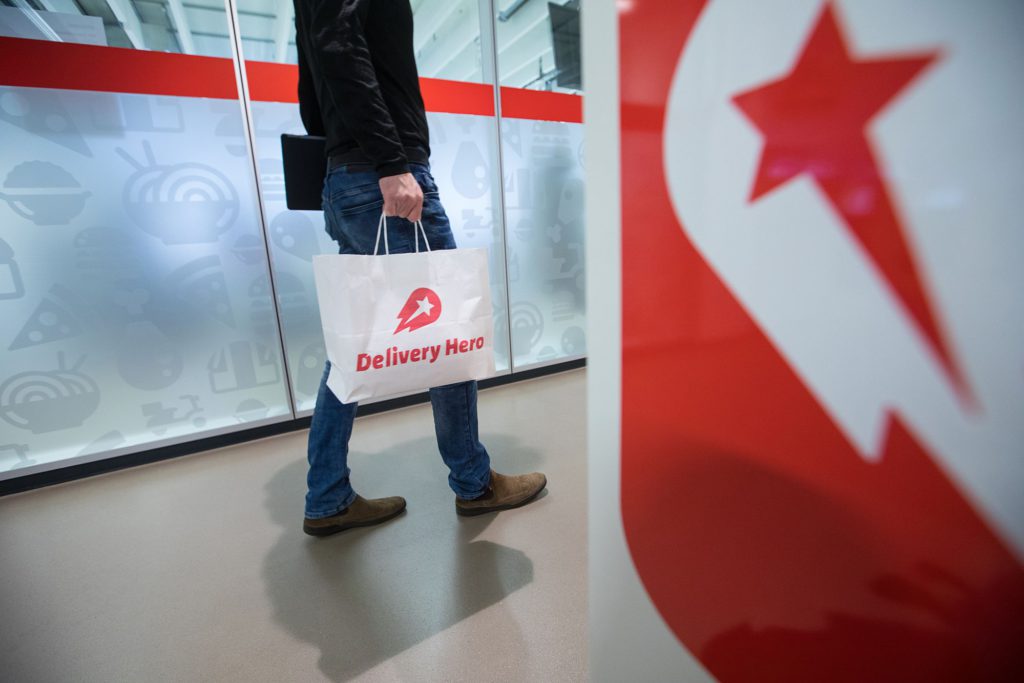(Bloomberg) — With a midnight deadline looming on New Year’s Eve, Germany’s Delivery Hero SE clinched an eleventh-hour deal for a majority stake in Spanish peer Glovo. Two weeks later, it said it would sell down its holding of Latin-American company Rappi. Then on Tuesday it told investors its food-delivery business would break even within months.
The first announcement capped off another year of frenzied activity in the food-delivery sector, during which pandemic lockdowns caused sales to surge and investors to rush into established companies and rapid grocery startups alike.
Read More: Just Eat Takeaway Gains on Report of Possible Grubhub Action
But with markets cooling amid interest rate rises, Delivery Hero’s latter announcements are more illustrative of a shift in focus expected across the industry. With no slowdown of activity anticipated, 2022 is instead set to be marked by battles over market share through consolidation.
“The market’s appetite to fund European loss-making technology companies is diminishing,” Jefferies analyst Giles Thorne said in an interview.
Shares in Delivery Hero jumped over 9% after the company said its food delivery unit would break even in the second half. Chief Financial Officer Emmanuel Thomassin said in an interview the company is also looking to build out an ads business and buy-now-pay-later service.
Read more: Delivery Hero Eyes Advertising, Buy-Now-Pay-Later to Grow Sales
Amsterdam-based Just Eat Takeaway.com NV perhaps faces the most pressure of the major delivery companies, however, with its shares down more than 40% since the start of last year. On Wednesday, the company reported in a fourth-quarter update that order growth slowed.
Just Eat’s management has indicated to some investors they’re open to the idea of a sale of Grubhub, one person familiar with the matter said, but advisers are also pitching a take-private deal or breakup, according to separate people. A Just Eat spokeswoman declined to comment.
Just Eat Takeaway shares rose as much as 7.6% in trading in Amsterdam on Thursday, the most since September.
Activist investor Cat Rock Capital Management LP is among shareholders pushing for a sale or spinoff of Grubhub just months after the U.S. business was acquired. Just Eat has previously said Grubhub has “strategic value” and expects the unit to be part of further consolidation.
Speaking on Just Eat’s analyst call on Wednesday, Chief Executive Officer Jitse Groen said: “To be quite honest with you, we are open to anything that makes Grubhub stronger that makes Just Eat Takeaway strong.”
It’s not just Grubhub, either: Just Eat is also working to sell its 33% stake in Brazilian delivery company iFood. It said in August it rejected a 2.3 billion euro ($2.6 billion) bid, but former Just Eat executive David Buttress, who led the deal for iFood, said the stake could be worth twice that and expects a deal in the first half of this year so the company “can keep the wolf from the door.”
Just Eat also faces a battle in Germany, a key market with new entrants Uber Technologies Inc. and DoorDash Inc. looking to cut into its market share.
Rapid Groceries
Meanwhile, the spate of startups that sprang up around the pandemic offering delivery of groceries and convenience goods within 15 minutes are also poised for a new phase.
Gorillas Technologies GmbH, which now has 12,000 employees and saw 10 million orders placed last year, has been among the technology-driven companies pursuing partnerships with traditional grocers such as Britain’s biggest, Tesco Plc.
After a year of rapid expansion, Gorillas will “shift from growth to value” in 2022, CEO Kagan Sumer said. He expects companies that make it through industry consolidation will have better access to capital as competing startups exit the sector via acquisition or ceasing operations.
Gorillas and Tesco aren’t alone in their tie-ups: Wm Morrison Supermarkets Plc recently expanded its partnership with Deliveroo, cooperating to develop mini-fulfillment centers for rapid delivery of essential items.
Deliveroo, which has seen its stock sink nearly 50% since going public last March, has also held talks with rapid grocery startups about potential acquisitions such as the U.K.’s Dija, according to people familiar with the matter. A Deliveroo spokesman declined to comment.
Read more: Just Eat Enters U.K. Grocery Delivery With Asda Partnership
North American market leaders will likely keep their eyes on Europe after San Francisco-based DoorDash agreed to acquire Finland’s Wolt Enterprises Oy in a 7-billion-euro ($8.1 billion) deal in November. Around the same time, DoorDash also approached Glovo about a potential acquisition, according to people familiar with the matter, before Delivery Hero ultimately clinched the deal.
Spokespeople for DoorDash and Glovo declined to comment.
One key moment for the industry’s prospects coming up could be the initial public offering of Gopuff, a Philadelphia-based pioneer in the rapid delivery sector. It’s in talks with banks about an initial public offering to take place as soon as the latter half of this year, Bloomberg News reported.
The company has already signed deals in Europe, including one to acquire Dija, as part of a geographic expansion.
“My expectation is that in 2022 the lens new entrants in the delivery space are viewed through will get more critical,” said Dan Folkman, Gopuff’s senior vice president of business. “A clear path to strong unit economics is going to be key and that’s something that we’ve demonstrated.
“Expect this to be a massive growth year for the category,” he added.
Read more: Getir Said to Seek $12 Billion Valuation in New Investment Round
(Updates with CEO comments, share price update.)
More stories like this are available on bloomberg.com
©2022 Bloomberg L.P.











